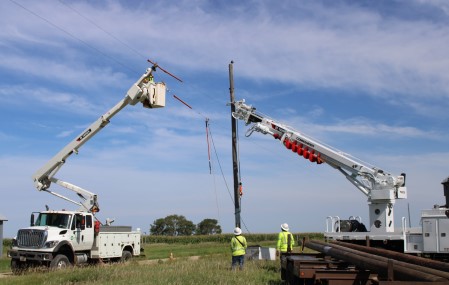What Does ‘Insulated’ Really Mean?
Electrocution is an ever-present danger when working on or near electrical components. The bucket trucks and digger derricks used by electric utility field crews are insulated, but in all reality, the safe operation of this equipment is not as simple as using the term ‘insulated’ but depends on following safe work practices. The protection offered by this equipment is limited, depending on condition and cleanliness, and it’s important to understand why.
Bucket trucks and digger derricks with insulated booms can only prevent current flow from the platform through the boom to the vehicle. They cannot provide protection against phase-to-phase or phase-to-ground contacts occurring at the boom-tip, above the insulating boom sections.
Non-Conductive does not mean insulation
Bucket trucks and Digger Derricks use what are commonly called “non-conductive” material in their construction. Just because a material is called “non-conductive” does not mean it provides the necessary insulation.
Insulation provided in a bucket truck or digger derrick is a combination of insulating materials, sufficient separation of conductive materials, cleanliness, condition, and testing to verify that the material is providing insulation. The insulation provided will depend on the condition and cleanliness, but a visual inspection will not guarantee insulation.
Covers, guards, jibs, and winch lines are made from non-conductive or insulating material. They may not provide sufficient separation and may not be maintained in a clean undamaged condition. They are not tested to verify insulation; so, cannot be expected to provide personal protection. The platform liner and the insulated booms between the bands of arrows are the only areas tested to verify insulation. The upper boom is the only area tested and rated at the rating indicated on the machine and in the manuals.

Always Consider the Boom Tip to Be Conductive
Boom-tips of bucket trucks and digger derricks, of necessity, must contain metal components. Metal conducts electricity. Moreover, under certain circumstances, and to varying degrees, electricity will track across or through non-metallic components (fiberglass covers, jibs, load lines, and structures, hoses, etc.). Electricity will even arc through air – thus, the boom-tip of a bucket truck or a digger derrick must be considered conductive and used as described in the manuals!
Rules of Thumb:
Always wear insulated protective equipment (PPE), use conductor cover-ups, and maintain required clearances (MAD) when in the vicinity of energized conductors.
If any part of the boom-tip contacts an energized conductor, the entire boom-tip, including the control handle, must be considered energized.
If any part of the boom-tip contacts a grounded object, the entire boom-tip, including the control handle, must be considered grounded.
Bottom Line
The protection offered by insulated bucket trucks and digger derricks is limited, depending on condition and cleanliness. Think of them as a tool that will only reduce the chance of a current flowing from the boom tip to ground through the boom if proper inspection and maintenance is performed. Failure to follow proper work practice when using the bucket truck or digger can cause severe injury or death if contact occurs to an energized component. Only Category A aerial units which are tested daily before use will provide primary protection. All other aerial categories or digger derricks provide only secondary protection, primary protection is PPE, coverup, and MAD.
Most importantly, operators need to follow their employers work rules, ANSI NESC requirements, OSHA regulations and the equipment manufacturers information to reduce the chance of serious injury or death.

.png?sfvrsn=cfc0900d_0)